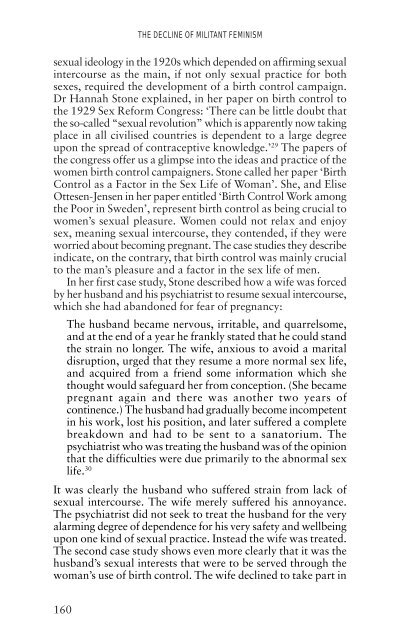The Spinster and Her Enemies - Feminish
The Spinster and Her Enemies - Feminish
The Spinster and Her Enemies - Feminish
Create successful ePaper yourself
Turn your PDF publications into a flip-book with our unique Google optimized e-Paper software.
THE DECLINE OF MILITANT FEMINISM<br />
sexual ideology in the 1920s which depended on affirming sexual<br />
intercourse as the main, if not only sexual practice for both<br />
sexes, required the development of a birth control campaign.<br />
Dr Hannah Stone explained, in her paper on birth control to<br />
the 1929 Sex Reform Congress: ‘<strong>The</strong>re can be little doubt that<br />
the so-called “sexual revolution” which is apparently now taking<br />
place in all civilised countries is dependent to a large degree<br />
upon the spread of contraceptive knowledge.’ 29 <strong>The</strong> papers of<br />
the congress offer us a glimpse into the ideas <strong>and</strong> practice of the<br />
women birth control campaigners. Stone called her paper ‘Birth<br />
Control as a Factor in the Sex Life of Woman’. She, <strong>and</strong> Elise<br />
Ottesen-Jensen in her paper entitled ‘Birth Control Work among<br />
the Poor in Sweden’, represent birth control as being crucial to<br />
women’s sexual pleasure. Women could not relax <strong>and</strong> enjoy<br />
sex, meaning sexual intercourse, they contended, if they were<br />
worried about becoming pregnant. <strong>The</strong> case studies they describe<br />
indicate, on the contrary, that birth control was mainly crucial<br />
to the man’s pleasure <strong>and</strong> a factor in the sex life of men.<br />
In her first case study, Stone described how a wife was forced<br />
by her husb<strong>and</strong> <strong>and</strong> his psychiatrist to resume sexual intercourse,<br />
which she had ab<strong>and</strong>oned for fear of pregnancy:<br />
<strong>The</strong> husb<strong>and</strong> became nervous, irritable, <strong>and</strong> quarrelsome,<br />
<strong>and</strong> at the end of a year he frankly stated that he could st<strong>and</strong><br />
the strain no longer. <strong>The</strong> wife, anxious to avoid a marital<br />
disruption, urged that they resume a more normal sex life,<br />
<strong>and</strong> acquired from a friend some information which she<br />
thought would safeguard her from conception. (She became<br />
pregnant again <strong>and</strong> there was another two years of<br />
continence.) <strong>The</strong> husb<strong>and</strong> had gradually become incompetent<br />
in his work, lost his position, <strong>and</strong> later suffered a complete<br />
breakdown <strong>and</strong> had to be sent to a sanatorium. <strong>The</strong><br />
psychiatrist who was treating the husb<strong>and</strong> was of the opinion<br />
that the difficulties were due primarily to the abnormal sex<br />
life. 30<br />
It was clearly the husb<strong>and</strong> who suffered strain from lack of<br />
sexual intercourse. <strong>The</strong> wife merely suffered his annoyance.<br />
<strong>The</strong> psychiatrist did not seek to treat the husb<strong>and</strong> for the very<br />
alarming degree of dependence for his very safety <strong>and</strong> wellbeing<br />
upon one kind of sexual practice. Instead the wife was treated.<br />
<strong>The</strong> second case study shows even more clearly that it was the<br />
husb<strong>and</strong>’s sexual interests that were to be served through the<br />
woman’s use of birth control. <strong>The</strong> wife declined to take part in<br />
160

















